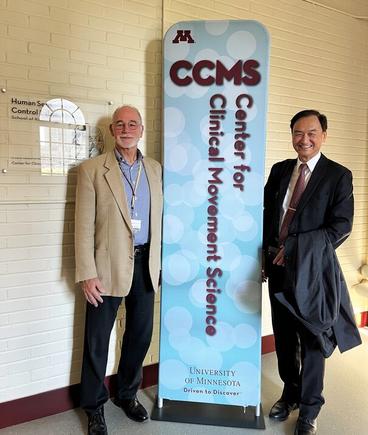
Who We Are
The Center for Clinical Movement Science is an interdisciplinary organization at the University of Minnesota focusing on problems affecting the human motor system. Its faculty offers perspectives from the fields of engineering, kinesiology, and the neurological, rehabilitation and clinical sciences. Their research provides a better understanding of the underlying disease processes that lead to movement impairments. Its products are new knowledge, procedures, therapies and devices that will aid and enhance the care and treatment of age-related changes and diseases affecting human movement.
News
28 Mar 2024
CCMS member Ann van de Winckel to study chronic neuropathic pain in spinal cord injury

Dr. van de Winckel, assistant professor in rehabilitation sciences, received a $664,000 from NIH to the examine the feasibility of Qigong as a behavioral treatment for chronic neuropathic pain in adults with spinal cord injury (SCI). Current accessible treatment options for SCI are primarily pain medications with insufficient benefits and significant risks for addiction and adverse effects. Of the available mind and body approaches, Qigong is the most accessible for adults with SCI with evidence for effectiveness in reducing pain.
10 Jan 2024
CCMS member Joshua Aman receives NIH funding to study pathophysiology of Parkinson's disease
Dr. Joshua Aman, assistant professor at the department of neurology, recently received a $615,000 award to characterize the pathophysiological role of the pallido-thalamocortical motor pathway in Parkinson's disease. The primary goals of this project are to understand the network brain activity that underlie slowness of movement (bradykinesia) in Parkinson's disease and to identify specific neural pathways associated with improved bradykinesia via deep brain stimulation.
28 Dec 2023
Boyer publishes with CCMS colleagues in Journal of Pediatric Rehabilitation Medicine
Dr. Elizabeth Boyer, CCMS member and researcher at Gillette Children's in St. Paul, published a new study that examined ankle proprioception in children with cerebral palsy. There is no established clinical standard to evaluate ankle proprioception in children with cerebral palsy. This study compared ankle position sense of children with cerebral palsy (CP) to age-matched children who are typically developing and found that as ankle position sense thresholds are elevated in children with CP.
16 Oct 2023

Taiwanese biomedical engineering researcher visited with CCMS colleagues
Dr. Fong-Chin Su, professor of biomedical engineering of National Cheng Kung University in Tainan, Taiwan visited campus labs of CCMS faculty in mechanical engineering and kinesiology as well as the Institute of Engineering in Medicine. He presented his innovative research and development work on how to measure finger forces in clinical populations to the CCMS colloquium.
15 Aug 2023
Clinical Physiology and Movement Science course offered this fall semester
Introduction in Clinical Physiology and Movement Science is the anchor course for the free-standing graduate minor in CPMS administered through CCMS. This 3-credit course is designed to give students an overview into the fields of clinical physiology and clinical movement science. It provides a basic understanding of clinical issues related to human motor function and physiological parameters of human performance. It presents the newest research methods to study human movement and physiological function and explains how these methods produce clinically relevant research findings.
14 Oct 2022
Ph.D. Position in the Movement Control and Rehabilitation Lab
The Movement Control and Rehabilitation Lab in the Department of Rehabilitation Medicine at the University of Minnesota is recruiting a highly motivated candidate for a Ph.D. in Rehabilitation Science, with a start date as early as Spring 2023. Our lab is interested in examining fundamental questions of movement control in humans with the goal of designing non-invasive strategies for rehabilitating movement in chronic stroke survivors.
The successful candidate will contribute to ongoing research in upper limb control of movement in chronic stroke survivors and develop an independent project to examine the role of cognition on movement execution. Candidates with a background in human movement (biomedical engineering, neuroscience, kinesiology, neurorehabilitation, or a related field) are encouraged to apply. Prior research experience with human subjects testing, movement analysis, and MATLAB programming are highly desirable. Interested candidates should email their CV and a statement of interest to Dr. Shanie Jayasinghe at
[email protected].
5 Oct 2022
CCMS joined CATSS to seek NSF funding for pre- and postdoctoral training
The Center joined the Center for Applied and Translational Sensory Science to collaboratively submit an NRT training grant proposal to the National Science Foundation. The aim of this training grant to educate the future work force in applied sensorimotor science.
27 Aug 2022
Robert Scheidt from Marquette University visited CCMS affiliated labs and speaks to CCMS colloquium
The Center has started again to invite faculty researchers from other institutions to campus. During his recent visit on 25/26 August, Dr. Robert Scheidt visited various labs and interacted with pre- and postdoctoral researchers in the labs of Dr. Hawe (Neural Lab), Dr. MacKinnon (Movement Disorders Laboratory), Dr. Konczak (Human Sensorimotor Control Lab), Dr. Jayashinghe (Movement Control and Rehabilitation Lab) and Dr. Van de Winckel (Brain Body Mind Lab).